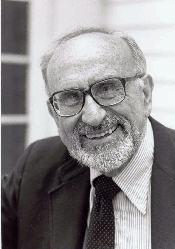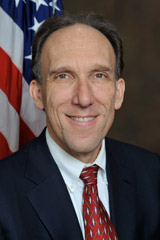In economics, industrial organization is a field that builds on the theory of the firm by examining the structure of firms and markets. Industrial organization adds real-world complications to the perfectly competitive model, complications such as transaction costs, limited information, and barriers to entry of new firms that may be associated with imperfect competition. It analyzes determinants of firm and market organization and behavior on a continuum between competition and monopoly, including from government actions.

Deregulation is the process of removing or reducing state regulations, typically in the economic sphere. It is the repeal of governmental regulation of the economy. It became common in advanced industrial economies in the 1970s and 1980s, as a result of new trends in economic thinking about the inefficiencies of government regulation, and the risk that regulatory agencies would be controlled by the regulated industry to its benefit, and thereby hurt consumers and the wider economy. Economic regulations were promoted during the Gilded Age, in which progressive reforms were touted as necessary to limit externalities like corporate abuse, unsafe child labor, monopolization, pollution, and to mitigate boom and bust cycles. Around the late 1970s, such reforms were deemed burdensome on economic growth and many politicians espousing neoliberalism started promoting deregulation.
Energy economics is a broad scientific subject area which includes topics related to supply and use of energy in societies. Considering the cost of energy services and associated value gives economic meaning to the efficiency at which energy can be produced. Energy services can be defined as functions that generate and provide energy to the “desired end services or states”. The efficiency of energy services is dependent on the engineered technology used to produce and supply energy. The goal is to minimise energy input required to produce the energy service, such as lighting (lumens), heating (temperature) and fuel. The main sectors considered in energy economics are transportation and building, although it is relevant to a broad scale of human activities, including households and businesses at a microeconomic level and resource management and environmental impacts at a macroeconomic level.
Irwin M. Stelzer is an American economist who is the U.S. economic and business columnist for The Sunday Times in the United Kingdom and was for The Courier-Mail in Australia. In the United States, he was a contributing editor at The Weekly Standard, and is a contributing editor for the American Interest. He is Director of Economic Policy Studies at the Hudson Institute. Stelzer is a consultant on market strategy, pricing and antitrust issues, and regulatory matters for U.S. and United Kingdom industries. He is also an occasional contributor to The Guardian, the Daily Telegraph, Standpoint and the New Statesman. He resides in the United States. Some British politicians and newspapers have vilified Stelzer as Rupert Murdoch's right-hand man, an assertion that Stelzer denies.
In economics, market concentration is a function of the number of firms and their respective shares of the total production in a market. The market concentration ratio measures the concentration of the top firms in the market, this can be through various metrics such as sales, employment numbers, active users or other relevant indicators. In theory and in practice, market concentration is closely associated with market competitiveness, and therefore is important to various antitrust agencies when considering proposed mergers and other regulatory issues. Market concentration is important in determining firm market power in setting prices and quantities.

Alfred Edward Kahn was an American professor, an expert in regulation and deregulation, and an important influence in the deregulation of the airline and energy industries. Commonly known as the "Father of Airline Deregulation," he chaired the Civil Aeronautics Board during the period when it ended its regulation of the airline industry, paving the way for low-cost airlines, from People Express to Southwest Airlines.
The MIT Department of Economics is a department of the Massachusetts Institute of Technology in Cambridge, Massachusetts.

Carl Shapiro is the Transamerica Professor of Business Strategy at the Haas School of Business at the University of California, Berkeley. He is the co-author, along with Hal Varian, of Information Rules: A Strategic Guide to the Network Economy, published by the Harvard Business School Press. On February 23, 2011, The Wall Street Journal reported that President Barack Obama intended to nominate Shapiro to his Council of Economic Advisers.
David Sparks Evans is an American economist specializing in antitrust and two-sided markets. He is the chairman of Global Economics, Inc., and founding editor of Competition Policy International. He teaches at the University College London, where he is the co-executive director of the Jevons Institute for Competition Law and Economics, and at the University of Chicago Law School.
Paul Lewis Joskow is an American economist and professor. He became President of the Alfred P. Sloan Foundation on January 1, 2008. He is also the Elizabeth and James Killian Professor of Economics, Emeritus at MIT. He has served on the MIT faculty since 1972. From 1994 through 1998 he was Head of the MIT Department of Economics. From 1999 through 2007 he was the Director of the MIT Center for Energy and Environmental Policy Research. Since rejoining in 2018 from his 1988-2007 term, Professor Joskow is Research Associate on the National Bureau of Economic Research (NBER).
Frederic Michael Scherer is an American economist and expert on industrial organization. Since 2006, he continues as a professor of economics at the JFK School of Government at Harvard University.
Franklin Marvin Fisher was an American economist. He taught economics at the Massachusetts Institute of Technology from 1960 to 2004.
An electric utility is a company in the electric power industry that engages in electricity generation and distribution of electricity for sale generally in a regulated market. The electrical utility industry is a major provider of energy in most countries.

Toulouse School of Economics is a school of economics, affiliated with Toulouse 1 Capitole University, a constituent college of the Federal University of Toulouse Midi-Pyrénées. It is located in the city of Toulouse, France. While the core focus is economics, TSE offers a range of academic degrees spanning licences, master's and a doctoral (PhD) programme. According to RePEc, TSE was ranked the 9th most productive research department of economics in the world and the 3rd in Europe by April 2019.
William Breit (1933–2011) was an American economist, mystery novelist, and professional comedian. Breit was born in New Orleans. He received his undergraduate and master's degrees from the University of Texas and his Ph.D from Michigan State University in 1961. He was an Assistant and Associate Professor of Economics at Louisiana State University (1961-1965) On the recommendation of Milton Friedman he was interviewed and hired at the University of Virginia where he was Associate Professor and Professor of Economics (1965-1983). He returned to his San Antonio as the E.M. Stevens Distinguished Professor of Economics at Trinity University in 1983 and retired as the Vernon F. Taylor Distinguished Professor Emeritus in 2002. He is considered an expert in the history of economic thought and anti-trust economics. He established the Nobel Laureate Lecture Series at Trinity University and is most notable as a mystery novelist where their murder mysteries are solved by applying basic economic principles.

Lawrence J. White is Robert Kavesh Professor of Economics at New York University's Leonard N. Stern School of Business. During 1986–1989 he was on leave to serve as board member, Federal Home Loan Bank Board, in which capacity he also served as board member for Freddie Mac; and during 1982–1983 he was on leave to serve as Director of the Economic Policy Office, Antitrust Division, US Department of Justice. He is the General Editor of The Review of Industrial Organization and formerly Secretary-Treasurer of the Western Economic Association International.
Adam B. Jaffe is a freelance economist working in Boston, Massachusetts. He was previously Director of Motu Economic and Public Policy Research, in Wellington, New Zealand, and a professor of economics at Brandeis University. His areas of expertise include Industrial Organization, technological change and innovation, law and economics, and environmental economics. The overarching theme of his work is focused on the process of technological change and innovation.
Benjamin A. Olken is an American economist and professor at the Massachusetts Institute of Technology (MIT). Moreover, Olken leads the Abdul Latif Jameel Poverty Action Lab (J-PAL), a research centre specialized on the use of randomized evaluations for the purpose of studying poverty alleviation, as one of its Directors. His research focuses on the political economy of developing countries, especially regarding the role of corruption and the impact of interventions addressing corruption.
Catherine D. Wolfram is an American micro-economist, academic and researcher. Catherine Wolfram was named in March 2021 as the United States Department of the Treasury Deputy Assistant Secretary for Climate and Energy Economics She is the Cora Jane Flood Professor of Business Administration and Associate Dean for Academic Affairs at the Haas School of Business at University of California, Berkeley where she also serves as a Faculty Director of The E2e Project and as Scientific Director for Energy and the Environment at Center for Effective Global Action. She also directs the National Bureau of Economic Research's Environment and Energy Economics Program.
Timothy Francis Bresnahan is an American economist who researches industrial organization. He was a founding co-editor of the Annual Review of Economics, a fellow of the Econometric Society, and recipient of a BBVA Foundation Frontiers of Knowledge Award in 2017.





